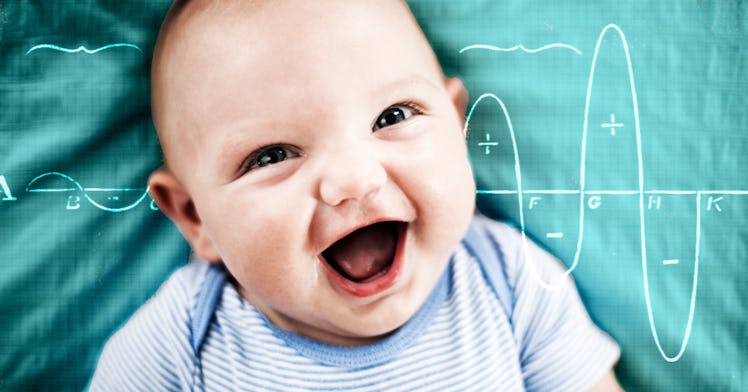Babies Laugh While Inhaling, More Like Monkeys Than Humans
If you're baby laughs like a wild animal, it might be because they have more in common with them than you think.

Babies laugh more like non-human primates than their own human parents, according to a new study presented at the Acoustical Society of America. If you found that funny and happened to chuckle, take note—adult humans are the only primates who laugh almost exclusively while exhaling. Chimps, and human babies, laugh while inhaling.
“Adult humans sometimes laugh on the inhale but the proportion is markedly different from that of infants’ and chimps’ laughs,” study coauthor Disa Sauter, a psychologist and professor at the University of Amsterdam in the Netherlands, said in a statement. “Our results so far suggest that this is a gradual, rather than a sudden, shift.”
Baby laughter is essential for parent-child bonding, and an important way for pediatricians to track cognitive development, research shows. While scientists know that humans happen to be the only primates who only laugh mainly while exhaling, they’re not exactly sure why and are just starting to understand how infant laughter works.
To learn more, Sauter and her team analyzed the laughter of 44 babies between the ages of 3 months and 18 months. They found that the youngest babies laughed while inhaling and exhaling, like nonhuman primates such as chimps. But as the infants grew, they began to laugh while exhaling—gradually progressing from chimp to human laugh.
“We are currently checking those results against judgments by phoneticians, who are making detailed annotations of the laughter,” Sauter says. Researchers suspect that the way laughter is instigated may have something to do with the results. For very young infants, laughter was provoked by physical play and tickling, whereas laughter for older children could result from social interactions too. Another theory as to why humans laugh on the exhale is that doing so requires distinct vocal controls needed for singing. Chimps and babies just don’t have the hardware, yet.
The next steps for Sauter and colleagues will involve trying to figure out why babies laugh in the first place, and using the research to inform how doctors diagnose and treat developmental disorders. “Beyond that, I’d be interested in seeing whether our findings apply to other vocalizations than laughter,” Sauter says.
“If we know what normally developing babies sound like, it could be interesting to study infants at risk to see whether there are very early signs of atypical development in their nonverbal vocalizations of emotion.”
This article was originally published on